Agrippina
Georg Friedrich Handel. Dramma per musica in three acts. 1709. Libretto by Vincenzo Grimani. First performance at the Teatro S Giovanni Grisostomo, Venice, on December 26, 1709. Performance attended: 13-01-2024, Dutch Premiere, the National Dutch Opera. Previously seen in Munich (July 2019), The Royal Opera (Sept-Oct 2019), Hamburg (May-June 2021 and December 2021) and again Munich (May 2022).
AGRIPPINA
Emperor Claudius is believed to have died in Britain. His wife Agrippina wants to make her son from a previous marriage, Nero, emperor, and she is helped by her friends-with-benefits Pallas and Narcissus. But Claudius is not dead. He is alive! Saved by Otho, who is declared his heir on his return to Rome. A complication: Claudius, Otho and Nero, all afflicted with the Jennifer Lawrence complex, are all three in love with Poppaea, who is completely done with the situation: she arranges for all three suitors to come to visit her at home, without knowing about each other. Claudius tries to bring order by recognizing Otho as his heir and giving Poppaea to Nero. All fails, and then he lets Agrippina have her way: he leaves the Empire to Nero and Poppaea to Otho.
Musical Director Ottavio Dantone; Director Barrie Kosky; Orchestra Accademia Bizantina; Agrippina (wife of Claudius; soprano) Stéphanie d’Oustrac; Nerone (her son) John Holiday; Poppea (lover of Claudius; soprano) Ying Fang; Claudio (Roman Emperor; bass/baritone) Gianluca Buratto; Ottone (warlord, savior Claudius; tenor) Tim Mead; Pallante (released slave; bass) Tommaso Barea; Narciso (see Pallante; tenor) Jake Ingbar; Lesbo (servant Claudius; bass/baritone) Georgiy Derbas-Richter.
Staging: *
Music: ****
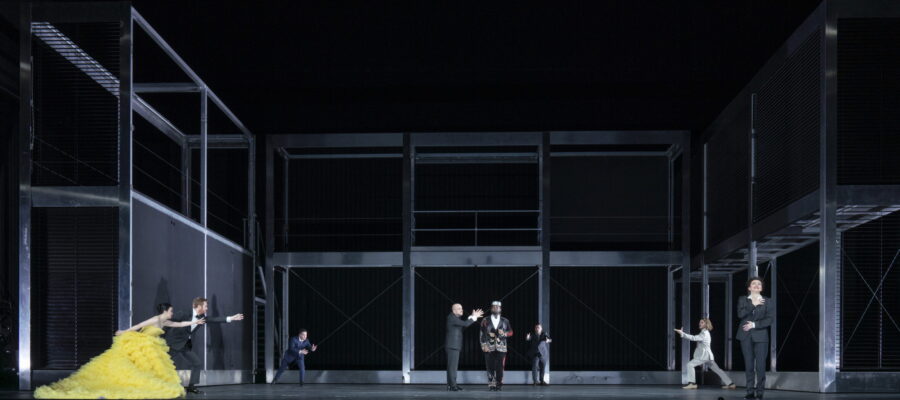
Agrippina can be called a cruel satire, but it is definitely not a comic opera. It is pure poison.
About Agrippina we read from Tacitus (Annales XIV) that, possessed by her will to retain power, she offered herself to her drunken son for blood-soaked sex, a hobby promoted in the 1970s by progressive “free spirits.”
Her horrified entourage brought in the released slave (made-slave-but-now-not-more) Acte to drain Nero’s bodily fluids so that they passed Agrippina by. The monstrosity conceived by Agrippina’s mind and her slutty past were an object of constant concern to those around her.
And Handel created a tune to match, namely the opera Agrippina, which was successfully performed in Venice in 1709. In his score, Handel excessively used music from his earlier works and from an opera by Reinhard Keiser. The opera begs for drastic cuts, even if we are spoiled with a decent direction – which, of course, we were denied at the Amsterdam premiere on Jan. 13. After two hours, we began to get bored to death and the exit beckoned. At The Music Theatre, all exits feel like emergency exits.
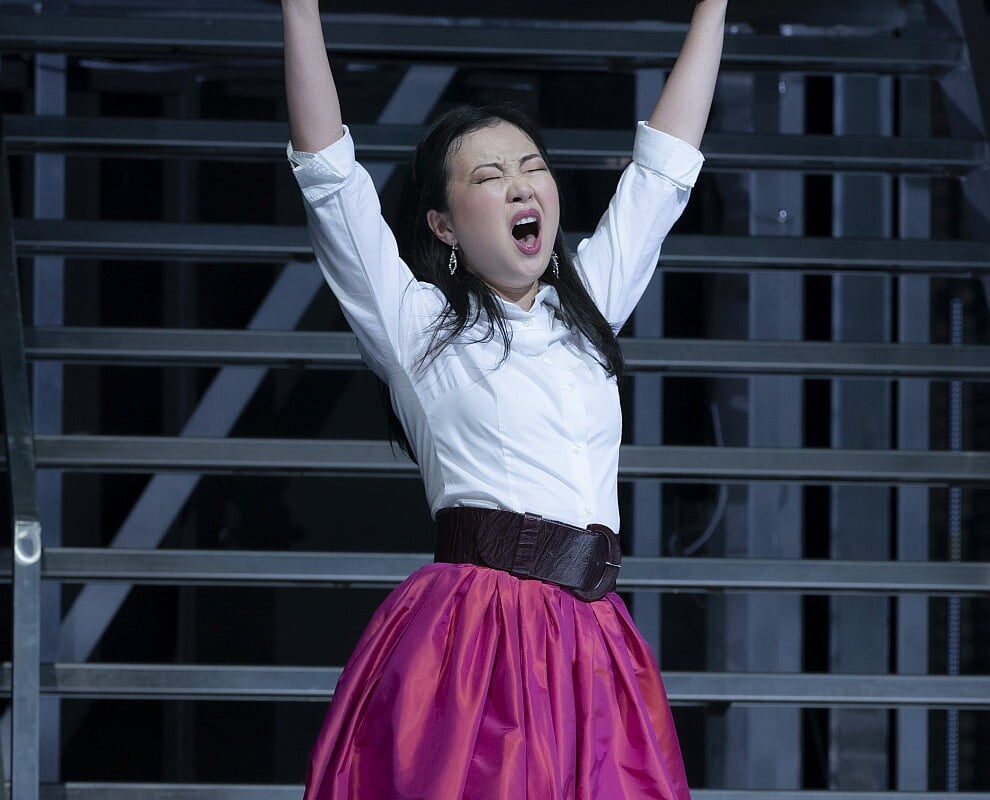
It was a long night for the soloists as well. ©DNO, Ben van Duin
Ancient Rome
Of course, we were not so naive as to think that we would get a hint of ancient Rome in this production: we are not that backward. And we know what to expect from The Dutch National Opera. By comparison, in La Clemenza di Tito, we rarely hear anything about Titus’ mercy in today’s lousy operatic era. His mild character is distorted or placed in a false context, while the finale, sextet with chorus “Tu, è ver, m’assolvi, Augusto,” often suffers the same fate or is even simply omitted.
Barrie Kosky has understood nothing of composer Handel’s and librettist Grimani’s intentions; the conspiracies and power-hungry sex are certainly to be taken seriously, but Kosky turns it into a (not even) Roman “On the Buses,” with a jumble of love couples and with clownish conspirators who, in lack of malice, rival David Copperfield. Besides pathos and drama, there is certainly irony to be discovered in Agrippina, but Kosky turns it into a flat farce and treated us to incomprehensible follies. It is a fairly common anomaly among egomaniacal directors: baroque operas that are not comic are “enriched” with embellishments borrowed from Comedy Capers. With Kosky, we are constantly reminded that the action is not to be taken seriously. Thus, once again, there had to be dancing. Sigh… Dancing in scenes that do not call for hopping at all is one of the scourges with which the Regietheater maintains its reign of terror. And we obediently dance along … to the tune of the pathetic flat thinker: The Modern Director, who of course is “controversial” and then automatically “genius.”
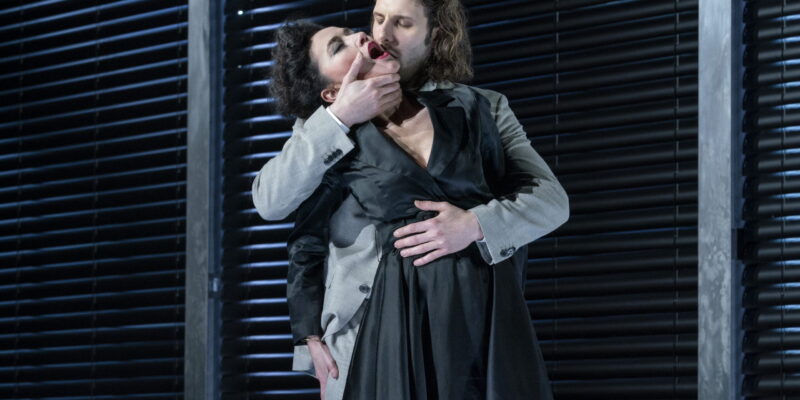
The acting in this Agrippina was also of a wretchedly flat level: overacting in the service of the misapplied element of “super lame humor.” The next idiocy, really the last we mention here – the intermission, which many were already looking forward to after half an hour, fell in the middle of the second act. A “Dramma per musica in three acts” ? Yes, that’s what Handel had in mind! But of course we know much better. The structure of three acts is entirely logical and sensible in terms of content, but if it can be done differently, it must be done differently: Agrippina was served in portions of one and a half acts. First act: 7 quarters of an hour! Fortunately, not only cupcakes and lemonade could be ordered in advance, but also catheters in various colors.
In keeping with the nuance so characteristic of Opera Gazet, we must honestly admit: there was one important cut. Juno’s descent to pronounce her blessing was withheld from us. A divine intervention, you can’t do that to snobbish People of Today. A ballet ( here appropriate ) was supposed to follow, but instead we got an instrumental intermezzo from Handel’s oratorio L’Allegro, Il Penseroso ed Il Moderato. Well, you have to fill up an evening like this somehow….
Sobering up: the opera Agrippina by GF Handel is about what it is about – it is what it is: one should only turn to the libretto. Of course, everyone is free to form extrapolating thoughts (the much-feared “what the opera is really about”). We ourselves are almost always satisfied with the story narrative and, above all, the music. That, of course, is an old-fashioned point of view. The thoughts are no longer free, but are now prescribed to us. The Dutch National Opera website has this silly text:
“[Kosky] also manages to make this opera a contemporary (!) masterpiece (!). No gowns and laurel wreaths, but tailored suits, ties and evening gowns. And Agrippina as a puppeteer, who is firmly in control.”
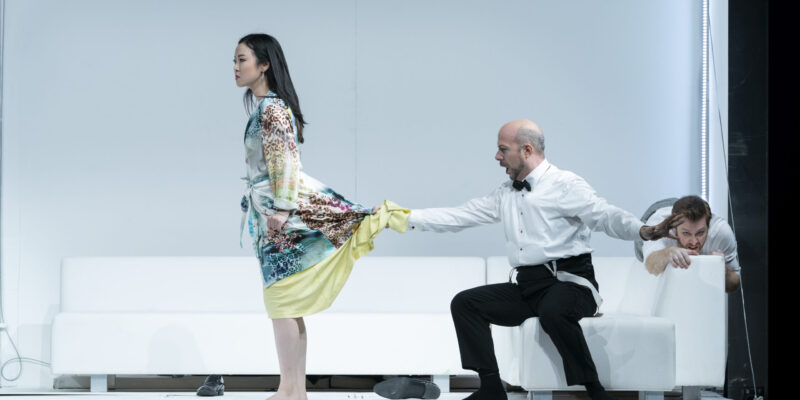
Agrippina was in reality not a puppet stall operator, but a deranged opportunist, power-hungry, poisoner, malignant nymphomaniac, and multiple guilty of incest.
Painful. Apparently the opera an sich is disqualified, and is being taken to Kosky’s Funny Farm to make it a “contemporary (?) masterpiece.” What “gowns and laurel wreaths” have to do with anything remains obscure; we fear the author is basing his/her image of ancient Rome not so much on Tacitus as on Ben Hur. Agrippina was eventually murdered by her own son. That is how firmly she “pulled the strings.”
It’s all in the music
The musical performance of Ottavio Dantone and his Accademia Bizantina was generally satisfactory; it was, however, all a bit too well behaved. Four hours of recitative-aria-recitative-aria is pretty damaging to a fragile constitution; of course, Dantone cum suis could not do much about that on their own, except to spice things up a bit. The sound of the Accademia Bizantina is pleasant, generous and at times deliciously off-key. That keeps one awake ! Too bad there was no brass present: horns and trumpets bring so much joy to the heart of the Sincere Opera Aficionado. A choir was also missing.
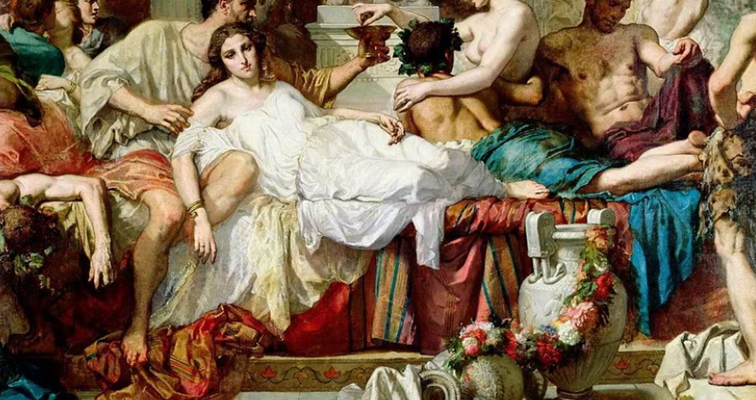
Of the soloists, we liked Stéphanie d’Oustrac very much, despite her clichéd gestures; her arias, on the other hand, were wonderful. John Holiday was the clown of the evening, with naughty winks at the audience – it is not inconceivable that his overly ostentatious performance was responsible for some technical mishaps. Gianluco Buratto: surely we remember him as Colline, in the Bohème production at DNO (2014 and 2017)? You know, that Bohème in which Marcello complains about the cold weather in pajamas, and with a white, fluorescent-lit glass mortuary rear wall as a backdrop. As Claudio, Gianluco Buratto made a very good impression: allure and temperament! We were gradually approaching what for us could be called the highlight of the evening: Ying Fang‘s Poppea. Although just recovered from serious Zauberflötitis contracted in Amsterdam, she overwhelmed and spoiled the connoisseurs with her pure lyrical soprano, full of impeccable coloraturas. Nowadays, the word “projection” will quickly make people think of a stuffy room where upscale office clerks (all “officers,” but no knights) stare at a PowerPoint presentation, but the vocal pedagogical term “projection” is best explained using Ying Fang’s stimmliche crown jewel. Her voice is beautifully round and clear, and literally sounds like a bell.
There was still quite a lot of audience left after the 4-hour exhausting performance, and we wouldn’t be surprised if Ms. Ying Fang was largely responsible for that.
Madam, by the way, faced unpleasantness in September 2023. She received death threats when she was mistaken for another Chinese soprano who sang the Russian folk song катюша (Katyusha) in the ruins of a Ukrainian theater where hundreds of people were previously killed by Russian bombs. Ying Fang received a lot of Internet mudslinging over herself after images were posted of Wang Fang performing the song in the ruins of the Drama Theater in Mariupol.
The excellent countertenor Tim Mead (Ottone) knows his way around Handel and baroque in general; convince yourself by clicking HERE. Tommaso Barea (Pallante) also impressed: his baritone thundered through the event center on Amsterdam’s Amstel River with focus, paradoxical warmth and seemingly effortlessness. Countertenor Jake Ingbar (Narciso) is an amazing talent, and so is baritone Georgiy Derbas-Richter, who took on the role of Lesbo.
WHAT ELSE IS NEW
It was an old-fashioned Dutch opera night: good music, fine soloists, but this time an evening that seemed to have no end and a directorial “concept” that might as well have applied to a cremated hot dog. Advice from Opera Gazet’s Board of Directors: should there be a revival next season (along with Die Zauberflöte, of course), chop the Agrippina bitch in half and perform it at the Ray Charles-Stevie Wonder Auditorium.
